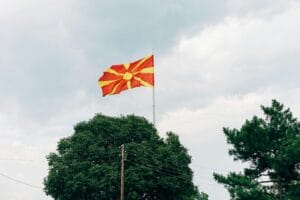In the annual EU enlargement report the European Commission recommend on April 17th that the European Union should open accession negotiations with Albania and Macedonia. The document marks the 10th time that the Commission recommended commencing negotiations with Macedonia. Greece has until so far blocked any attempt due to the name dispute. However with talks between Athene and Skopje going satisfactory, it’s likely that all member states will adopt the recommendations. For the first time the Commission is also satisfied with the conditions in Albania. “reform of the public administration [has been] consolidated, with a view to enhancing its professionalism and de-politicization.”
Although the accession talks will take years to round up, the report comes during a time of democratic backsliding in the Western Balkans. US-based watchdog Freedom House warned in its annual report that illiberal politics is becoming the ‘’new normal’’ in the Balkans. The backsliding calls into question whether the prospect of membership is enough for democratization in the region.
EU accension
Generally speaking it as assumed that the prospect of becoming EU member and especially the the process towards membership (accession negotiations) is the key that drives transformation and democratization in Europe’s backyard. It took former communist countries like Poland and Hungary only 15 years, from the fall of communism in 1989 to EU membership in 2004, to become consolidated democracies. The European Union used her soft power to bolster the political, economic and societal transformations of the countries. While the United States used its military might in the form of NATO to guarantee security in the region.
This approach was initially also applied in the Western Balkans after the devastating Yugoslav wars of the 1990’s. Political instability was one of the biggest concerns. Most government weren’t even 5 years old. At the EU-Western Balkans Thessaloniki Summit in 2003, the EU committed itself to integrating the region in the EU.
The prospect of accession led to notable reforms resulting in transition from stabilizing to integrating the region. Croatia joined the Union in 2013, while Serbia and Montenegro started negotiations in 2014. Now Albania and Macedonia are also poised to start the talks with Brussels.
Democratic backsliding
With the authoritarian trends in Europe, and worldwide, most of the countries in the region are experiencing stagnation when it comes to rule of law and democracy according to Freedom House. The frontrunners in the region, Serbia and Montenegro, both have a government that on the surface use democratic institutions, but use corruption, repression of the media and opposition and cronyism to stay in power. In Serbia President Aleksandar Vučić has established a strong one man rule with absolute majority in the parliament , while in Montenegro Milo Djuknovic has been in power since 1991.
The autocratic rule of dominant political parties and their strongman have become the ’new normal’’ in the region according to Freedom House. Undemocratic moves have included vague party financing methods, politicization of law enforcement, and attempts to undermine independent media. A clear sign that despite the prospect of ascension and negotiations democratic backsliding is currently a phenomenon in the Balkans.
Root of the problems
Many analysts have argued that the lack of a clear short term European perspective has been the reasons for the lack of democratization in region. European Commission President Jean-Claude Juncker repeated this after the report was published. This view entails that the European disillusion with the prematurely accession of Romania and Bulgaria in 2007 shattered European hopes for quick accession of new candidate countries. As a result the Balkan elites weren’t tempted to adopt the much needed reforms to join the Union, thus creating the status quo. Toby Vogel of the Democratization Policy Council argued however that the status quo is the result of the accession process itself. He argued that Brussels has indirectly become an ‘’agent of status quo”. Instead of pursuing clear driven goals that would pressure Balkan countries into democratization, the EU choose stability over reform. Thinking that the prospect of accession will be enough to drive democratization eventually. Membership has become a destination for the countries, instead of a step in democratization in the Western Balkans, resulting in the political elites only taking the necessary steps for accession instead of full democratization.
New strategy: focus on democracy
The publication of EU enlargement strategy for the Balkan in February showed that the Union recognizes that the current policies will not result in democratization nor safeguard the stability of the region. Vogel therefore argued that the current understanding of the situation should be used for a transformation of the EU Balkan policy. With the recommendations of the Commission and the upcoming Western Balkan summit in Sofia, the Commission has the chance to reset the agenda.
Vogel proposed that the Union should recommit itself to the values set out in the Lisbon Treaty as guideline toward the region. This should entail a strict approach to democracy, human rights, press freedom and freedom of though and actions. This in effect would reaffirm the credibility of the Union as actor in the region. To bolster this credibility the EU should have to show it strength on the ground. The currently under funded missions in the Balkan, EUFOR and KFOR, should be fully operational.
The accession process should be dominated by leading EU members with political force such Germany and France. They should pressure the future Commission to be more straightforward and less diplomatic in tone. This way the future of the Balkan can be set in policy. Accession process should no longer focus on stabilizing the region, but in democratizing it.
.jpg)


